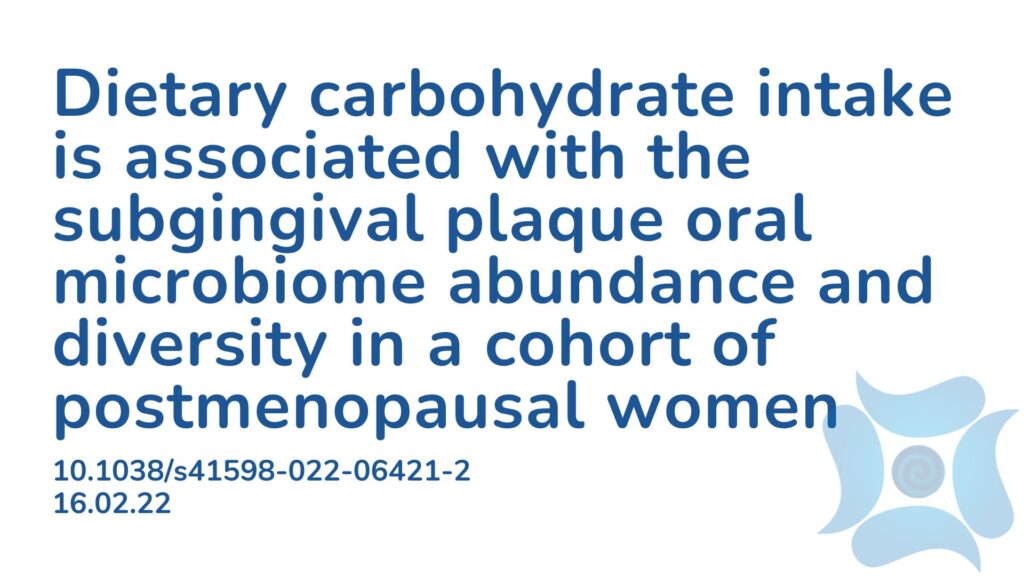Summary: There an increasing amount of research finding the health of our oral microbiome contributes largely to our risk of oral diseases and tooth decay, however there is limited evidence on the link between carbohydrate intake and the oral microbiome. Consering that the oral microbiome is associated with more than just the health of the mouth, but also other diseases, understanding the potential contributing factors such as dietary intake is critically important. This paper investigates if total carbohydrates, glycemic load, starch, fibre, monosaccharides or disaccharides were associated with positive or negative changes in the oral microbiome in subgingival plaque samples of 1204 women. The results show that different types of carbohydrates have different impacts on particular bacteria strains, however it was highlighted that higher intakes of high glyemic load foods and sucrose may contribute to negative oral health outcomes, and in turn influence poorer overall health outcomes.
Abstract:
Limited research exists on carbohydrate intake and oral microbiome diversity and composition assessed with next-generation sequencing. We aimed to better understand the association between habitual carbohydrate intake and the oral microbiome, as the oral microbiome has been associated with caries, periodontal disease, and systemic diseases. We investigated if total carbohydrates, starch, monosaccharides, disaccharides, fiber, or glycemic load (GL) were associated with the diversity and composition of oral bacteria in subgingival plaque samples of 1204 post-menopausal women. Carbohydrate intake and GL were assessed from a food frequency questionnaire, and adjusted for energy intake. The V3–V4 region of the 16S rRNA gene from subgingival plaque samples were sequenced to identify the relative abundance of microbiome compositional data expressed as operational taxonomic units (OTUs). The abundance of OTUs were centered log(2)-ratio transformed to account for the compositional data structure. Associations between carbohydrate/GL intake and microbiome alpha-diversity measures were examined using linear regression. PERMANOVA analyses were conducted to examine microbiome beta-diversity measures across quartiles of carbohydrate/GL intake. Associations between intake of carbohydrates and GL and the abundance of the 245 identified OTUs were examined by using linear regression. Total carbohydrates, GL, starch, lactose, and sucrose intake were inversely associated with alpha-diversity measures. Beta-diversity across quartiles of total carbohydrates, fiber, GL, sucrose, and galactose, were all statistically significant (p for PERMANOVA p < 0.05). Positive associations were observed between total carbohydrates, GL, sucrose and Streptococcus mutans; GL and both Sphingomonas HOT 006 and Scardovia wiggsiae; and sucrose and Streptococcus lactarius. A negative association was observed between lactose and Aggregatibacter segnis, and between sucrose and both TM7_[G-1] HOT 346 and Leptotrichia HOT 223. Intake of total carbohydrate, GL, and sucrose were inversely associated with subgingival bacteria alpha-diversity, the microbial beta-diversity varied by their intake, and they were associated with the relative abundance of specific OTUs. Higher intake of sucrose, or high GL foods, may influence poor oral health outcomes (and perhaps systemic health outcomes) in older women via their influence on the oral microbiome.
Article Publication Date: 16.02.22
DOI: 10.1038/s41598-022-06421-2




